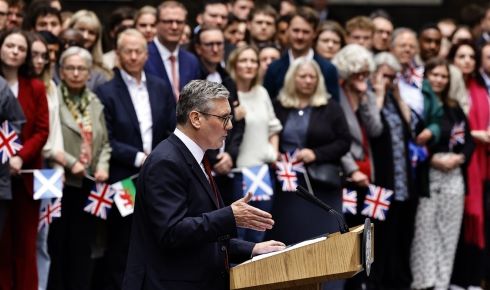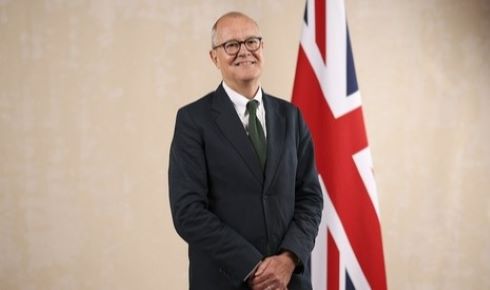A manifesto for bioscience

6th September 2024
The RSB is calling for the Government to enact a suite of measures in its first year to make the UK a leader in addressing global challenges
While the announcement of a general election in July came as a shock to many, the RSB has been looking towards a general election since 2023. Before the election was called on that wet May afternoon, the Society’s science and education policy teams had developed a detailed manifesto. We then refined this into priorities for the first year of a new Parliament, which we sent to the major parties and key parliamentary candidates as they developed their campaigns in the build-up to the election¹.
In its first month in power, the new Labour Government has already set out a suite of measures in the King’s Speech that we welcome. For example, the ambition to create a National Wealth Fund to stimulate innovation and opportunities in the life sciences and energy sectors, and the commitments to recruit 6,500 teachers, review school curricula and assessment, and create ‘Skills England’ to address workplace skills shortages.
However, over the coming months, as we reach out to new appointees in relevant positions across the Government, we will continue to make the case that long-term investment in bioscience is required for a sustainable and prosperous future, and for the importance of world-class STEM teaching, learning and expertise.
Leading R&D
Prioritising investment in the UK’s research and development sector is key to sustainable economic growth and the security and wellbeing of our society. We continue to work with partner organisations to engage with Government on R&D budget commitments.
To maximise productivity and tackle interrelated global challenges – such as climate change, biodiversity loss, antimicrobial resistance, food insecurity and pollution – we want to see coordination and investment in our regional, national and international scientific strengths. And for a more research-intensive workforce and economy, we would like to see the Government continue to implement the previous government’s R&D People and Culture Strategy² and its Science and Technology Framework³.
To ensure sound, evidence-based advice for policymaking, and to ensure ministerial attention is devoted to science-based issues of existential importance for people and the planet, we want to see a strong, systemically coordinated cohort of scientifically literate personnel in the civil service and Government. To build and balance local, regional, national and international exchange and collaboration, we must remove barriers to attracting talent and research to the UK. We want to see ongoing participation in schemes including Horizon Europe and other EU Framework Programmes.
 The RSB's Honorary Fellow Patrick Vallance is the new Science Minister, as Lord Vallance
The RSB's Honorary Fellow Patrick Vallance is the new Science Minister, as Lord Vallance
STEM strategy
Another priority is developing the world-class education and training necessary for a world-class STEM workforce. There is a crisis in teacher recruitment and retention in England, and the National Curriculum is restrictive and overburdened, especially in biology.
The Society calls on the new Government, in its first year, to collect better data on teachers and disciplinary expertise, and to set out a coordinated STEM education strategy with investment in teachers. With an ambitious, systemic approach to subject-specific professional development and retraining, we want to see more specialist science teachers recruited and the need for them to teach outside their areas of expertise removed. Measures that would help increase the number of skilled biology teachers include committing to a £20,000 teacher training bursary for biology specialists and expansion of the teacher training scholarship to more subjects, including biology.
We are also calling on the new Government to reform the National Curriculum and GCSE and A level qualifications, drawing on the expertise of the Society and other science specialists to inform curricula and qualifications.
The RSB’s Evolving 5–19 Biology recommendations and curriculum framework (with a summary for policymakers)⁴ should form the basis of reform. Learners aged 14–16 should follow a single route through the sciences, providing equality of opportunity for progression after GCSE. This single route should include biology, chemistry and physics as identifiable subjects, timetabled distinctly and taught by subject specialists deployed within their specialism.
Practical work in schools, colleges and universities is an essential but neglected element of science learning and dedicated funding is needed.
Biosciences are key
The new Government has many challenges to tackle in its first year, but research, development and innovation are key drivers of UK economic growth. Biology also lies at the heart of solutions to existential threats to our planet and health, from food insecurity to future pandemics.
The biosciences can support a fairer and more prosperous society, targeting investment in local talent, infrastructure and resources in under-funded areas of the country, which will further attract international talent and investment. However, to drive sustainable growth for the future and equip all citizens for modern life, we must ensure that we have a secure pipeline of expert biologists and a scientifically literate population.
Find out more about our Election manifesto.
References
1) RSB Election manifesto
2) Research and development (R&D) people and culture strategy
3) The UK Science and Technology Framework
4) Evolving 5-19 Biology: recommendations and framework for 5-19 biology curricula
Dr Mark Downs CBiol FRSB is chief executive of the RSB.


